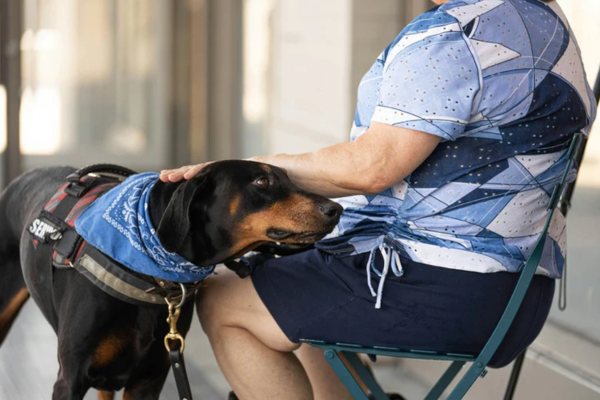Service dogs provide invaluable support to individuals with disabilities. However, many people with service dogs still face challenges accessing public spaces. Here are some tips on how you can advocate for service dog accessibility in 2025:
Educate Yourself on Laws & Regulations
The Americans with Disabilities Act (ADA)
The Americans with Disabilities Act (ADA) is a civil rights law prohibiting discrimination against individuals with disabilities. It ensures equal access to employment, public accommodations, transportation, and state and local government programs and services. The ADA requires businesses and public entities to make reasonable accommodations for individuals with disabilities, including those with service dogs.
State and Local Laws
Thankfully, many states and local governments have laws that protect the rights of individuals with disabilities in addition to the Americans with Disabilities Act.
Educate Others on the Importance of Service Dogs
Debunk Myths About Service Dogs
Many people have misconceptions about service dogs. Educate others about the roles of service dogs and the importance of treating them with respect. Feel confident sharing your knowledge about service dogs and their benefits with others to help alleviate misinformation and garner understanding.
Share Your Service Dog Story
Share your personal experiences with service dog rights to raise awareness and empathy. Whether you or someone you know has a service dog, it’s important to share our positive experiences with others to help them understand and appreciate service dogs’ role in our society.
Document Incidents of Discrimination
Keep a Record
If you encounter discrimination or a denial of service, document the incident, including the date, time, location, and individuals’ names. These details will be critical in the reporting process and will help governing bodies ensure discrimination is dealt with effectively.
Report Violations
You should report violations of the ADA to the appropriate authorities, such as the Justice Department or your local disability rights organization.
Advocate for Policy Changes
Contact Local Officials
Reach out to your local representatives to advocate for policies that support access to service dog rights.
Support Organizations like Justice Speaks
Donate to or volunteer with organizations that advocate for disability rights, such as Justice Speaks. At Justice Speaks, we advocate for disabled people with service dogs, protect their right to an assistance animal in all public spaces, and educate the broader community about this fundamental—and life-changing—civil liberty. Learn more about our organization today.
Use Social Media
Share Your Experiences
Use social media to share your experiences, both positive and negative, to raise awareness. Social media platforms are fantastic outlets for sharing experiences and connecting with community members. There is power in numbers and awareness, and leveraging social media is the perfect way to capture the attention of the masses.
Engage with Others
Connect with other individuals with disabilities and service dog owners to share tips and support each other. Research local disability organizations in your area. These organizations often have support groups, forums, and events where you can connect with others. In addition, you can join online groups and forums dedicated to disability rights, service dogs, and specific disabilities. These platforms allow you to connect with people from all over the world and share your experiences.
Understanding your rights under the Americans with Disabilities Act (ADA) is crucial for advocating for service dog rights and accessibility. This federal law protects individuals with disabilities, including those with service dogs.
Key strategies for advocacy include:
- Educating Others
- Documenting Incidents
- Reporting Violations
- Advocating for Policy Changes
- Leveraging Social Media
These steps can help create a more inclusive and accessible society for individuals with disabilities and their service dogs. Contact us to learn more about what you can do to support service dogs in your community.


